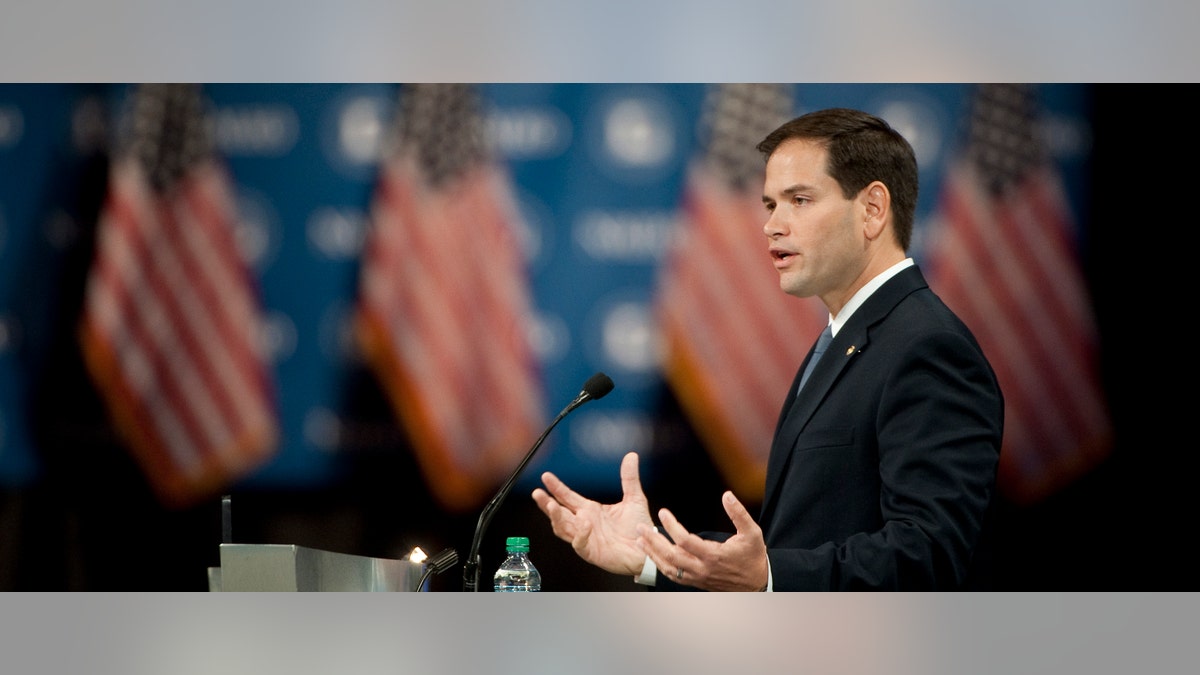
LAKE BUENA VISTA, FL - JUNE 22: U.S. Sen. Marco Rubio (R-FL) addresses the audience at the 29th annual NALEO conference June 22, 2012 in Lake Buena Vista, Florida. NALEO (National Association of Latino Elected and Appointed Officials) also hosted presumptive Republican presidential nominee Gov. Mitt Romney on Thursday and U.S. President Obama on Friday. (Photo by Edward Linsmier/Getty Images) (2012 Getty Images)
Republican Mitt Romney made it clear last week that Florida Senator Marco Rubio is being “thoroughly vetted” for as a possible vice presidential running mate, rebutting an ABC News report to the contrary.
If that is the case, then Governor Romney will want to pick up a copy of journalist Manuel Roig-Franzia’s unauthorized biography of the 41-year-old senator, “The Rise of Marco Rubio,” which was released last week.
In an exclusive interview for Fox News Latino, Roig-Franzia told me that he investigated all aspects of his personal and political life – both the good and the bad.
Rubio has been nervous about the Roig-Franzia book. He even moved up the release of his own autobiography, “An American Son,” apparently out of fear of bad publicity come from damaging content in Roig-Franzia’s book.
In fact, the book is generally quite flattering to Rubio. But there are four points in the book that Romney will have to deal with before he puts Rubio on the ticket.
1) The GOP and Romney have wanted nothing to do with undocumented immigrants but Rubio’s grandfather, Pedro Victor Garcia, came to the United States illegally in 1962.
Garcia wasn’t able to make a living in the U.S. after initially coming here legally in 1956. So leaving wife and family he went back to Cuba in 1959 after Fidel Castro had taken over the country. Garcia did not like the Castro regime and illegally returned to the U.S. He was ordered to leave but stayed in the U.S. illegally for three years until he won a special visa for political refugees after the Cuban missile crisis.
2) There are some on-going money questions about Rubio’s past that could lead to legal problems. Rubio charged thousands of dollars of personal items to a credit card that was given to him by the Republican Party of Florida. He later repaid the money.
Roig-Franzia ran down the list of items Rubio purchased with his GOP credit card: “Some of the things were just silly,” the writer said. “Wine at a wine shop near his house, a hundred and thirty-two dollar haircut, or around that figure, for a haircut. An iPad. Movie tickets. It’s just, looking over the list, it’s hard to imagine.”
Former Florida Governor Charlie Crist failed to make the credit card charges an issue in his campaign against Rubio in the 2010 GOP primary. But that does not mean the issue won’t be revived in a national campaign.
3) Rubio is extremely close to embattled South Florida Republican Congressman David Rivera.
Since being elected to the House in 2010, Rivera is the target of state and federal investigations into his personal and campaign finances. Roig-Franzia says “the folks that I talk to up in Tallahassee, have spent a huge amount of time with both of them, they describe Marco Rubio and David Rivera as closer than brothers.” Rubio has been given numerous opportunities to publicly distance himself from his friend but has chosen to stand by him.
4) Rubio misstated the dates of his parent’s exile from Cuba on numerous occasions. Rubio’s parents left Cuba in 1956 before Fidel Castro came to power.
The Washington Post, where Roig-Franiza is a writer, did not wait for publication of his book to report the inconsistency earlier this year. I asked Rubio about the discrepancy when I interviewed him for Fox News Latino this past April.
“My parents were never able to return to Cuba,” Rubio said. “That option was taken off the table. They identified as exiles. They raised us as exiles. I was raised in a community of exiles. I did get the date wrong. I didn’t know. As soon as I knew, I stopped saying the wrong date. It doesn’t change the fundamental aspects of my story.”
And what does Roig-Franzia think of Rubio’s vice presidential prospects?
“I could see the camp, the Romney camp, looking at this and saying, wow, this guy really gets a lot of attention. He could help. And I could also see people within that group saying, wow, this guy gets a lot of attention, he can hurt.”
He also says Rubio has “the potential to be an historic figure.”
“How interesting would it be if, in consecutive election cycles, we ended up with a candidate who represented a first in American history,” the author said, referring to the first black president and now the possibility of the first Hispanic vice president.”
Roig-Franzia says his book is being translated into Spanish because of demand for it in Latin America and Spain where the possibility of the first Latino president has sparked interest in Rubio. The young Florida senator is already a world figure.












































